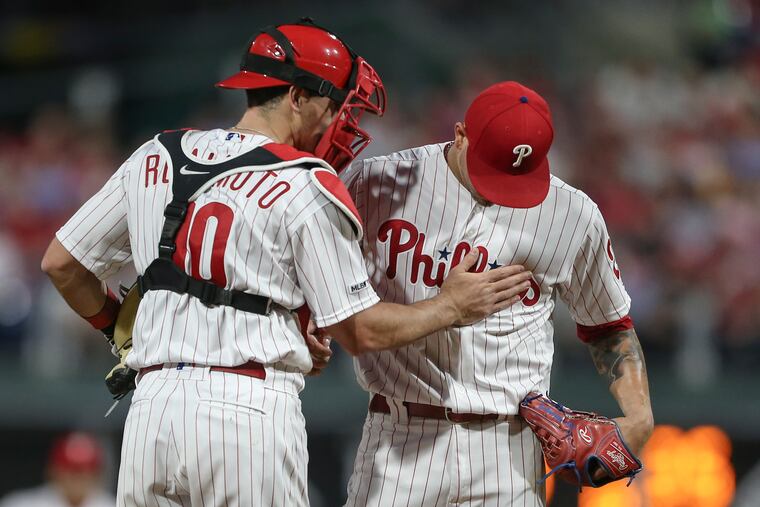Phillies starter Vince Velasquez’s pitch-count problem rears its ugly head against Tigers | Bob Brookover
Vince Velasquez had been the Phillies' best starting pitcher through the first 28 games of the season, but he offered a reminder of his inconsistent past during his Tuesday night start against the Detroit Tigers.

Vince Velasquez had 99 problems, and his pitch count was No. 1. It was clear as Gabe Kapler emerged from the home dugout with two outs in the top of the fourth inning Tuesday night that he was about to take the ball out of Velasquez’s hands.
The right-hander who opened the season at the bottom of the rotation had been the Phillies’ top starter through the first month of the season. In fact, going into Tuesday night’s start against the Detroit Tigers, he was the team’s wins above replacement (WAR) leader, according to BaseballReference.com. He had a 1.3, which put him nearly a full point ahead of a struggling Bryce Harper.
But track records matter, and, based on Velasquez’s first three seasons with the Phillies, it is way too soon to shift from wait-and-see mode to Vinny-day-is-winning-day. This outing, Velasquez’s fifth start of the season, was a not-so-subtle reminder as to why, and it helped contribute to a 3-1 loss to the Tigers.
After pitching at least five innings and allowing two runs or fewer in each of his first four starts, Velasquez departed after 3 2/3 innings and 99 pitches against the Tigers. The elevated pitch count was not entirely his fault, and a legitimate argument could be made that he should have allowed only two runs instead of the three with which he was charged.
The lack of offense, of course, was a big part of the story, too. In fact, Kapler thought the Phillies’ failure to score after the first was the primary reason his team lost.
Still, there were too many moments that reminded us of Velasquez’s past when walks and three-ball counts prevented him from going deep into ballgames, even when his stuff was good and the opposing team’s hit total was low.
A season ago was the perfect example of a typical Velasquez roller-coaster ride. He had a 5.70 ERA through his first six starts of the season, then posted a 3.51 ERA over his next 11 outings before finishing the year with an 8.45 ERA in his last nine starts.
We saw that same kind of inconsistency in each of his first two seasons with the Phillies, as well. He teased with that 16-strikeout shutout in his second career game with the Phillies against San Diego and when that 2016 season was over, there was reason to believe that Velasquez could take steps forward and possibly even become a top-of-the-rotation starter.
Maybe that will still happen, but starts like this one against Detroit create some doubt.
After one inning, it appeared as if Velasquez was going to continue his 2019 roll against a team with the highest strikeout percentage in the big leagues. His perfect first inning included an inning-ending strikeout against future Hall of Famer Miguel Cabrera on a fastball clocked at 95.8 mph. It was one of seven strikeouts on a night when Velasquez only recorded 11 outs.
After throwing only 17 pitches in the first inning, Velasquez needed 30 to get through the second, thanks in large part to a couple of walks. He escaped without allowing a run when he struck out opposing pitcher Spencer Turnbull.
The most disturbing part of the night for Velasquez and the Phillies came in the third. The pitcher opened the inning with a strikeout of leadoff hitter Jeimer Candelario, but then was victimized by a gift hit when Nicholas Castellanos popped up behind first baseman Rhys Hoskins, who could not find the ball in the air. He was not alone.
“It’s a ball that all three guys on a normal night can catch,” Kapler said, referring to Hoskins, second baseman Cesar Hernandez and Harper. “I’ve been there before as an outfielder. The ball goes up, you look up, you see black. That ball drops. It happens sometimes. It’s unfortunate, but it’s part of baseball.”
Castellanos got credit for a double he did not deserve. Velasquez threw up his hands and appeared visibly disturbed by the sequence of events.
“I wasn’t frustrated,” Velasquez said. “I threw my hands up because I couldn’t even see the ball. There was no frustration on my end. I mean, it stinks. The ball dropped, but what are you going to do when no one sees the ball?”
The next hitter – Cabrera – delivered an RBI single to left field. Velasquez made his biggest mistake of the night to Niko Goodrum, who slammed a down-and-in fastball into the right-field seats, giving the Tigers a 3-1 lead they would not relinquish.
“I had the intention of going in with that fastball and maybe I could have gone in a little bit more," Velasquez said. “Maybe I could have executed a backdoor slider, but those are the ifs, ands, and buts.”
Ronny Rodriguez followed with a one-out triple over Andrew McCutchen’s head in center field, but Velasquez, to his credit, pitched out of that jam with the help of his defense. His uneven outing continued in the fourth, however, when he struck out the first two batters before walking Candelario and giving up a single to Castellanos.
At that point, he had 99 pitches and Kapler saw that as a problem, so he made the call to the bullpen. Five Phillies relievers proceeded to keep the Tigers off the board the rest of the evening, but the offense managed just one hit the rest of the game.
“You just file this and move and learn from it,” Velasquez said. “Hopefully, I go eight innings and 99 pitches next time."